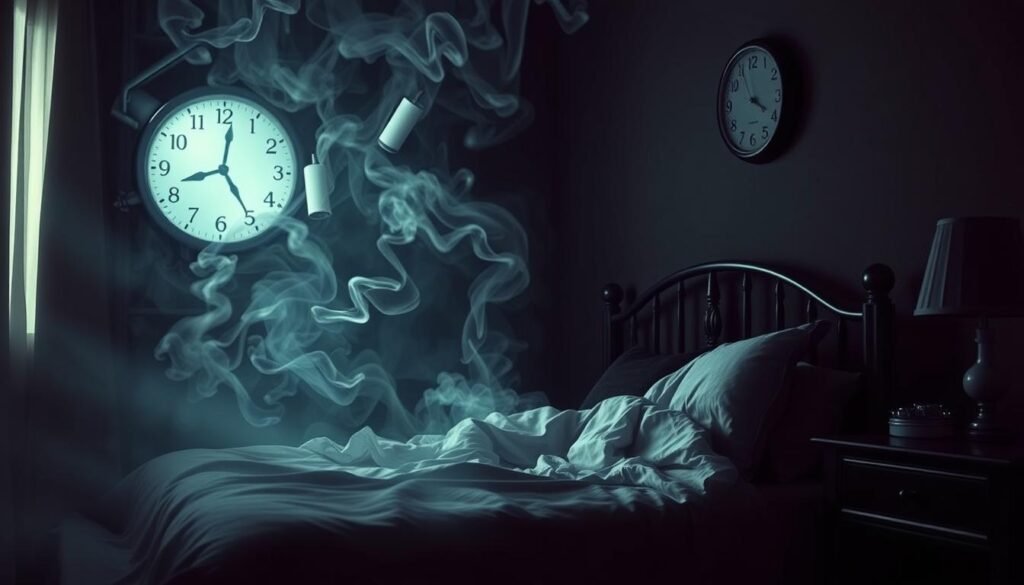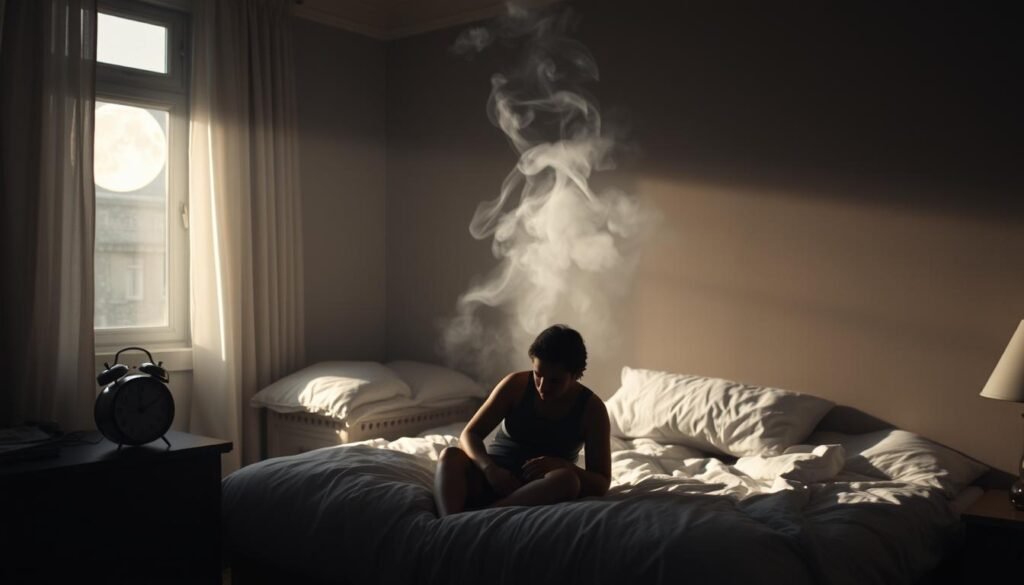Did you know that smokers can take 5 to 25 minutes more to fall asleep than those who don’t smoke? This fact highlights the complex link between nicotine and sleep problems. About 80% of smokers encounter problems with their sleep. Nicotine, being addictive, acts as a powerful stimulant. It messes with sleep patterns and makes various sleep problems worse.
Nicotine’s impact on our brain and body is essential to know for those fighting insomnia. People who use nicotine often struggle to begin or continue sleeping well. The struggle with this addiction goes beyond just sleeping problems. It makes treating insomnia harder and affects overall health. Despite fewer people smoking, many U.S. adults still have sleep issues.
Let’s look more closely at how nicotine affects our sleep cycle. This can lead to not only insomnia but also other serious health issues. We’ll see how nicotine use changes sleep patterns. Specifically, we’ll explore how it impacts our health.
Key Takeaways
- Smokers take 5–25 minutes longer than non-smokers to fall asleep.
- 80% of smokers face sleep disturbances regularly.
- Nicotine can disrupt sleep continuity when ingested too close to bedtime.
- Women in late mid-life who smoke are more vulnerable to insomnia.
- Improving sleep hygiene can effectively manage insomnia during nicotine withdrawal.
Understanding Nicotine and Its Effects on the Body
Nicotine is a strong substance found in tobacco. It greatly affects the heart and the whole body. It makes the brain more alert, attentive, and focused. People tend to use it many times a day, from minutes to hours apart.
Using nicotine often can lead to addiction. Folks might depend on it to feel normal or work well. Studies link smoking with higher rates of sleep problems like insomnia and sleep apnea. This suggests nicotine use can seriously harm health.
The long-term impact of nicotine is worrying. It can cause heart disease, cancer, and lung issues. These concerns can hurt sleep quality. Smokers often have trouble sleeping well. Although some may say they sleep okay, the risks of smoking and nicotine use are big.
Nicotine can give short energy boosts and alertness. However, its long-term use harms the heart and sleep. It’s important to know these effects if you care about your health and tobacco use.
The Impact of Nicotine on Sleep Patterns

Nicotine can make it hard for people to get good sleep. Studies show it messes with the body’s sleep cycles. Because of this, people often don’t sleep deeply and spend too much time in light sleep. This hurts the quality of their sleep.
Sleep Cycle Disruption
Many studies link nicotine with not being able to sleep well. Smokers often struggle to fall asleep and stay asleep. They wake up too early. Nicotine messes up the sleep cycle and causes problems. This means people don’t get the restful sleep they need.
| Study Group | Impact on Sleep | Findings |
|---|---|---|
| Young Individuals (12-17) | Vaping and Sleep Problems | Increased reports of restless sleep, nightmares, and daytime fatigue. |
| High School Students | Insufficient Sleep | E-cigarette users reported more sleep issues compared to smokers or non-users. |
| Adults (18-65) | Lower Sleep Quality | Vaping linked to reduced sleep hours compared to non-vapers. |
| General Findings | Sleep Disturbances | Nicotine disrupts both falling asleep and maintaining sleep across all forms of consumption. |
Nicotine affects sleep no matter how it’s used. For better sleep, thinking about nicotine’s effects is key. People should look into ways to quit if it’s affecting their sleep.
Nicotine and Insomnia: Unraveling the Connection

Exploring how nicotine affects sleep is important. About 1 in 10 Australians who smoke tend to struggle more with insomnia. This includes having trouble falling or staying asleep. Nicotine’s stimulant effects mess with our sleep cycles. This leads to worse sleep quality.
Smokers often sleep less and face more interruptions during sleep than non-smokers. Chronic coughing and breathing problems make insomnia worse. Quitting smoking can also cause sleep issues, adding to the challenge.
Vaping might seem better but it still hurts sleep. Even occasional vaping users can experience insomnia. Vaping a lot increases the risk of sleep apnea because it irritates the airways. Plus, nicotine users can take 5 to 25 minutes longer to fall asleep. This means their sleep quality is not as good.
It’s key to understand how nicotine and insomnia are linked. This knowledge helps create better treatments for smokers. There are clinical treatments that can improve sleep and well-being. For more info, check out this research. It discusses how smoking and insomnia are connected both ways. It shows why personalized treatment plans are crucial.
How Smoking Habits Influence Sleep Quality

Smoking habits significantly impact how well you sleep. Using nicotine often can make it hard to fall asleep and stay asleep. Smokers might find it tough to sleep well and wake up often.
There’s a clear link between how much you smoke and your sleep. People who smoke more have more sleep problems than those who don’t. In the US, over 83.6 million adults have sleep disorders, showing how wide this issue is. Also, studies involving 30,269 people show smoking affects sleep across different groups.
If you smoke a lot, your sleep might get worse over time. This is because needing nicotine can disrupt sleep. Research shows that being addicted to nicotine makes sleep problems more severe. It’s important to know how smoking can mess up your sleep.
Latest studies, including those on quitting smoking, help us understand sleep and smoking better. Stopping smoking can make your sleep better, which helps your overall health. For more info, check out research on smoking and sleep.
Sleep Disturbances Associated with Nicotine Use
Using nicotine can make it hard to sleep well. People who smoke are more likely to have sleep problems like sleep apnea and parasomnias. This means smokers might not get good quality sleep.
Nicotine messes with the brain and can ruin sleep patterns. This leads to trouble falling or staying asleep. Many people who use nicotine say they can’t sleep well.
Obstructive sleep apnea is a big concern for smokers. It causes breathing to stop and start during sleep. This leads to feeling very tired during the day and not thinking clearly.
Nicotine can also make parasomnias worse. This means more sleepwalking or night terrors. It makes sleeping even harder.
Sleep problems can really affect your health. They can lead to serious issues like heart disease and diabetes. Not getting enough sleep can also make you more likely to get depressed or overweight.
| Type of Sleep Disturbance | Description | Related Health Issues |
|---|---|---|
| Obstructive Sleep Apnea | Interrupted breathing during sleep, leading to poor sleep quality. | Increased risk of heart disease, diabetes, and cognitive decline. |
| Parasomnias | Abnormal behaviors such as sleepwalking and night terrors. | Anxiety disorders and potential injuries during episodes. |
| Insomnia | Difficulty falling or staying asleep, often linked to withdrawal. | Heightened risk of mood disorders and obesity. |
Nicotine Withdrawal and its Effects on Sleep
Nicotine withdrawal can mess up how you sleep, causing insomnia-like issues. People who stop smoking might feel more anxious and irritable. This affects how well they sleep. During the first days without nicotine, the body tries to adjust. This can make sleeping well even harder.
In research with 1,136 smokers, scientists noticed some patterns. The smokers were split into three groups: placebo, patch, and varenicline. Those on varenicline or the patch had more sleep problems. They had more trouble than the placebo group. This shows that quitting aids can affect sleep differently.
A lot of those studied didn’t break down nicotine fast. They found that worse sleep issues at the start meant a higher chance of starting to smoke again. While products like the patch and varenicline helped with withdrawal, they didn’t help sleep problems much.
Less than a quarter of people have sleep issues when they quit smoking. But for those who do, it usually gets better after four weeks. Taking walks or swimming helps reduce stress and can make sleep better. Watching what you eat at night is important too, as overeating can make sleeping hard. It’s also good to avoid caffeine six hours before bed. This can help with insomnia.
- Regular exercise aids in relieving tension.
- Manage late-night eating to avoid sleep disruptions.
- Limit caffeine consumption to improve sleep quality.
| Type of Intervention | Reported Sleep Disturbances |
|---|---|
| Placebo | Minimal Sleep Disturbances |
| Transdermal Nicotine | Increased Sleep Disturbances |
| Varenicline | Increased Sleep Disturbances |
Tobacco Addiction: A Barrier to Healthy Sleep
Tobacco addiction hurts your sleep and health. Nicotine makes it tough to fight off insomnia. The more you’re addicted, the worse your sleep gets.
Nicotine dependence hinges on specific brain receptors. When nicotine hits, you feel more awake, and your blood pressure rises. This messes with your sleep.
Quitting tobacco brings tough symptoms, like being cranky or anxious. Smokers find it harder to fall and stay asleep than non-smokers do.
Cigarette smoke has 4000 chemicals that harm your health and sleep. People who smoke tend to take longer to fall asleep and wake up more at night. A deep dive into this topic is crucial for better sleep, especially for smokers. Check out these findings for more.
| Sleep Issues | Smokers | Non-Smokers |
|---|---|---|
| Difficulty initiating sleep | Higher prevalence | Lower prevalence |
| Difficulty maintaining sleep | Higher prevalence | Lower prevalence |
| Unsatisfying sleep | Common | Rare |
| Shorter total sleep time | Observably shorter | Longer duration |
| Increased wake time during the night | Significant | Minimal |
Improving sleep means tackling tobacco addiction. Understanding how nicotine affects sleep can guide us toward better health choices.
Strategies for Improving Sleep Quality During Nicotine Withdrawal
Managing sleep during nicotine withdrawal needs smart steps to make sleeping better. Exercising regularly can make your sleep patterns better and cut down insomnia. It is key in treating insomnia. Physical activity fights withdrawal restlessness and boosts health. Making a workout schedule and sticking to it helps get the most out of exercise for sleep.
Cutting down on caffeine is also vital. Caffeine can make insomnia worse, especially if you have it later in the day. Good sleep habits are important too. You should make your sleeping area cozy, keep a regular bedtime, and limit how much you use screens before sleeping. These actions help make sleep better. You can get more tips on sleep habits from behavioral patterns that cause insomnia.
Nicotine replacement therapy can ease sleep problems from withdrawal if used right. It’s key not to use it too close to bedtime to avoid sleep issues. For those struggling a lot with insomnia, doctors can prescribe medications to help for a short time. Quitting tobacco slowly if you can, helps reduce withdrawal signs. This makes moving to better sleep easier.